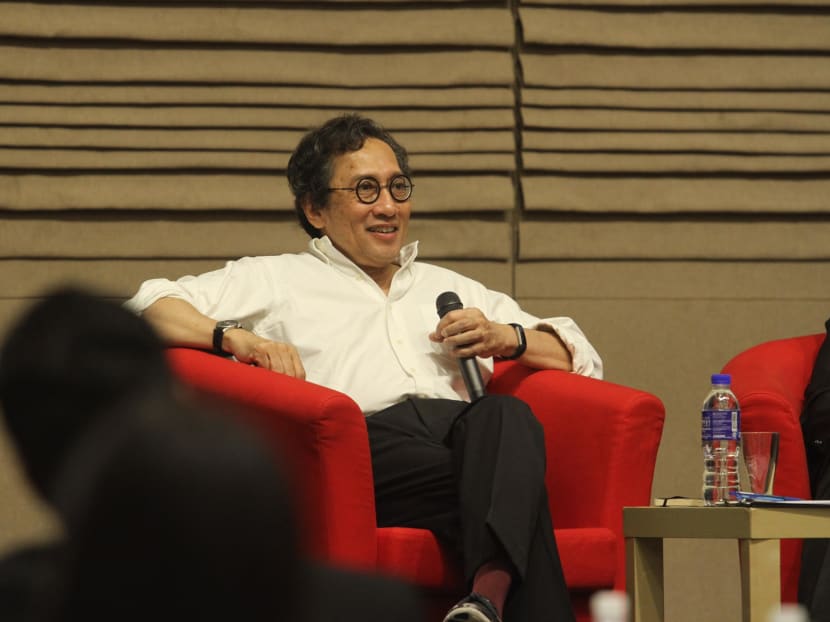S’poreans ‘naive’ about fake news threat; Beijing’s influence operations threaten social compact: Bilahari Kausikan
SINGAPORE — Many Singaporeans are "naive" about the threat posed by fake news, despite it being a fundamental national security issue, said veteran diplomat Bilahari Kausikan.

Responding to a report by the Select Committee on Deliberate Online Falsehoods, veteran diplomat Bilahari Kausikan reiterated in a Facebook post on Friday (Sept 21) that Beijing’s influence operations may threaten the Republic’s social compact.
SINGAPORE — Many Singaporeans are "naive" about the threat posed by fake news, despite it being a fundamental national security issue, said veteran diplomat Bilahari Kausikan.
Responding to a report by the Select Committee on Deliberate Online Falsehoods, Mr Kausikan reiterated in a Facebook post on Friday (Sept 21) that Beijing's influence operations may threaten the Republic's social compact.
A day earlier, the committee put forth a slew of recommendations to deal with the serious threat of fake news.
Mr Kausikan recounted how he had recently written about Chinese influence operations in Singapore, and the response on social media "was often angry and often echoed the line taken by the Chinese Embassy, in effect 'everyone does it'".
"That's somewhat akin to saying since many people beat their wives, wife-beating is OK. In any case, 'everyone does it' is true but trite," he said.
Mr Kausikan noted that the Government has expelled an American diplomat for trying to influence domestic politics here.
He said that American and Western influence operations usually seek to impose a western, liberal democratic political identity on Singapore. But this has limited attraction to the majority here.
"Chinese influence operations are more dangerous in a fundamental — indeed, existential — way," he said.
Chinese influence operations seek to impose a Chinese identity on multiracial Singapore and thus threatens the city state's core social compact of multiracial meritocracy, he said.
Mr Kausikan added: "They appeal to ethnic pride which is all too often only a tiny step away from ethnic chauvinism. This can strain social cohesion in a way western influence operations do not."
He said that the Select Committee's report delicately hinted at this when it said that Singapore's 'societal conditions' make us vulnerable to 'slow drip' falsehoods.
"Of course, we must be alert to western influence operations as well. But we should also understand the main threat," he said.
Array
WHAT HE SAID EARLIER
-
This is not the first time the former permanent secretary of foreign affairs, who now chairs the National University of Singapore's Middle East Institute, has drawn attention to the issue of Chinese influence operations.
-
In June, he said that China's public diplomacy in the region often involves presenting false choices in a binary fashion. He added that such psychological operations would fail once those being targeted are aware of Beijing's intentions.
-
This drew a sharp response from the Chinese Embassy. Ambassador Hong Xiaoyong stated that China does not manipulate other countries, adding that Mr Kausikan's conclusions "cannot be fair and right".
-
Mr Hong added: "I would say firstly that every country hopes to gain recognition and support for its development philosophy and foreign policies. In this sense, China is no different. Unlike some countries, however, China does not impose its ideology and development model."
-
In July, Mr Kausikan warned that China's influence attempts have been "particularly invidious because they attempt to foist a Chinese identity on multiracial Singapore." "Their methods are subtle and need to be better understood," he said.
SELECT COMMITTEE'S RECOMMENDATIONS
-
On Thursday, the 10-member committee recommended 22 measures to counter what it deemed a "live and serious threat" of weaponisation of fake news.
-
These include new laws and criminal sanctions to go after "hired guns" by crippling their revenue sources, and regimes that hold technology companies accountable, as well as coming up with a "national-level strategy and coordinated approach" to deal with state-sponsored disinformation operations.
-
The committee stressed the need to effectively deal with threats to national security and sovereignty. Perpetrators "may be motivated by politics, prejudice or ideology", it noted. "Individuals both local and foreign may also be motivated by profit, mischief or social connection," it said.









